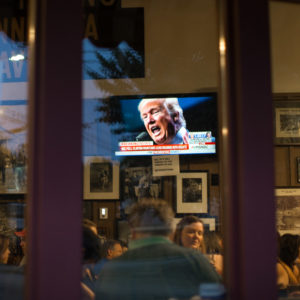President Donald Trump has come under intense scrutiny in the past week for his recent flurry of tweets suggesting that the federal government challenge broadcast licenses of networks that report what he calls “Fake News.”
“With all of the Fake News coming out of NBC and the Networks, at what point is it appropriate to challenge their License? Bad for country!,” Trump said on Twitter last week.
Trump expressed his outrage on Twitter after NBC News reported that he had once expressed a desire to increase the U.S. nuclear arsenal “tenfold.”
There’s no legal grounds thus far for Trump’s argument, and Federal Communications Commission Chairman Ajit Pai has already said “the FCC does not have the authority to revoke a license of a broadcast station based on the content of a particular newscast.”
Victor Pickard who’s a professor of communications at the University of Pennsylvania and a known American media studies scholar said that he felt Trump’s suggestions are particularly unusual.
“Presidents in the past have often tried to exert their influence over the FCC and news media outlets. But President Trump’s rhetoric is exceptional in its explicit aggression against the press,” Pickard said.
Nevertheless, it’s important to remember Trump is not the first President who wanted to potentially censor media organizations for unfavorable coverage. Both Democrats and Republicans in the past have expressed a desire to squelch news organizations that they felt were unfair in their reporting.
Thomas Hazlett, an economics professor at Clemson University who has authored multiple books on telecommunications policy and was formerly an economist at the FCC said that “Unfortunately. there is a long history of broadcast licensing being used to discourage unorthodox viewpoints or programming that is politically incorrect. Indeed, during the years of the Minow FCC the Fairness Doctrine was used to “harass and intimidate” small right-wing radio stations thought to be a partisan problem by the Democratic National Committee.”
Newton Minow, who was chairman of the FCC from 1961 to 1963 under President John F. Kennedy, described in a personal essay how Kennedy got angry one time because of a television news story. Minow said Kennedy called him furious about a NBC newscast (they really know how to get underneath a President’s skin apparently) where executives in the steel industry announced a price increase which Kennedy felt was a violation of an agreement he had negotiated with them earlier to avoid a strike.
“Did you see how those guys lied about me? Outrageous! Do something about it!,” Kennedy bellowed on the phone to Minow.
Minow decided not to do anything about it and didn’t act on the phone call, instead he called the White House the next day and told the president’s assistant, “He was lucky to have a friend at the FCC who knew not to pay attention to the president when the president was angry.”
President Kennedy ended up thanking Minow for his discretion and decision to do nothing; decades later Minow was awarded the Presidential Medal of Freedom by President Barack Obama in November of last year.
Another example is President Richard Nixon who in the early 1970s was recorded saying that The Washington Post would have “damnable, damnable problems,” due to the paper’s role in uncovering the Watergate scandal, as well as releasing the Pentagon Papers, the Florida Times Union reported.
“The main thing is the Post is going to have damnable, damnable problems out of this one,” Nixon was quoted as saying. “They have a television station … and they’re going to have to get it renewed.”
Nixon was referring to WJXT TV-4, which was one of two Florida stations owned by Post-Newsweek Stations, a broadcasting subsidiary of The Washington Post Company.
Washington Post Publisher Katherine Graham said in an interview with NBC at the time that former Attorney General Richard Kleindienst contacted the Post in 1971 “threatening us with a campaign against the press and with criminal prosecution if we did not return the Pentagon Papers after the Supreme Court decision allowing their publication.”
Within months, challenges were filed against the renewal of WJXT’s licenses, among the challengers in the case was George Champion Jr., Florida finance chairman of the 1972 Nixon re-election campaign. WJXT ended up facing multiple challenges before the FCC officially granted the station a renewed license in November of 1975.
Most recently, in 2004, Democrats flexed their political muscle to prevent a documentary that was critical of presidential candidate John Kerry from airing on Sinclair Broadcast Group, Fred Campbell, a Forbes contributor, reported.
Through letters to the FCC by dozens of members of Congress asking the chairman to investigate Sinclair for “anti-Kerry propaganda,” along with added pressure from a Democratic FCC Commissioner and from the Kerry campaign itself, Democrats succeeded in getting Sinclair to only release a shortened version of the documentary.
Democrats and Republicans have tried to stifle unfavorable coverage many times in the past. Most of the time they partake in verbal threats and outcries of injustice, but little to no federal action is actually taken in the long run. We’ll have to wait and see whether Trump will succeed in his attempt at censorship but it will be an uphill battle to do so, if history is any guide.
Note: Nihal was previously a political correspondent for Circa News, which is owned by Sinclair Broadcast Group.

